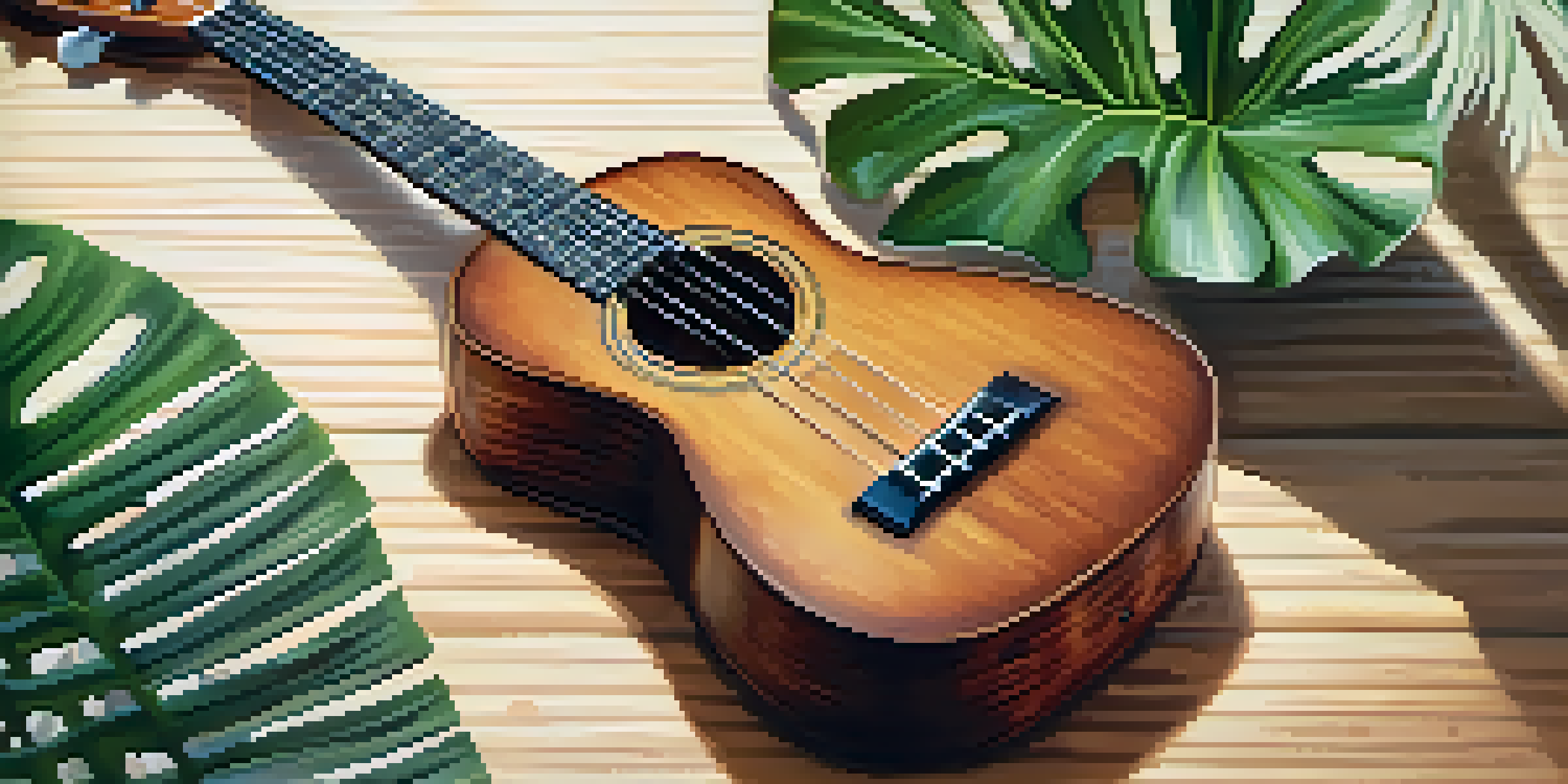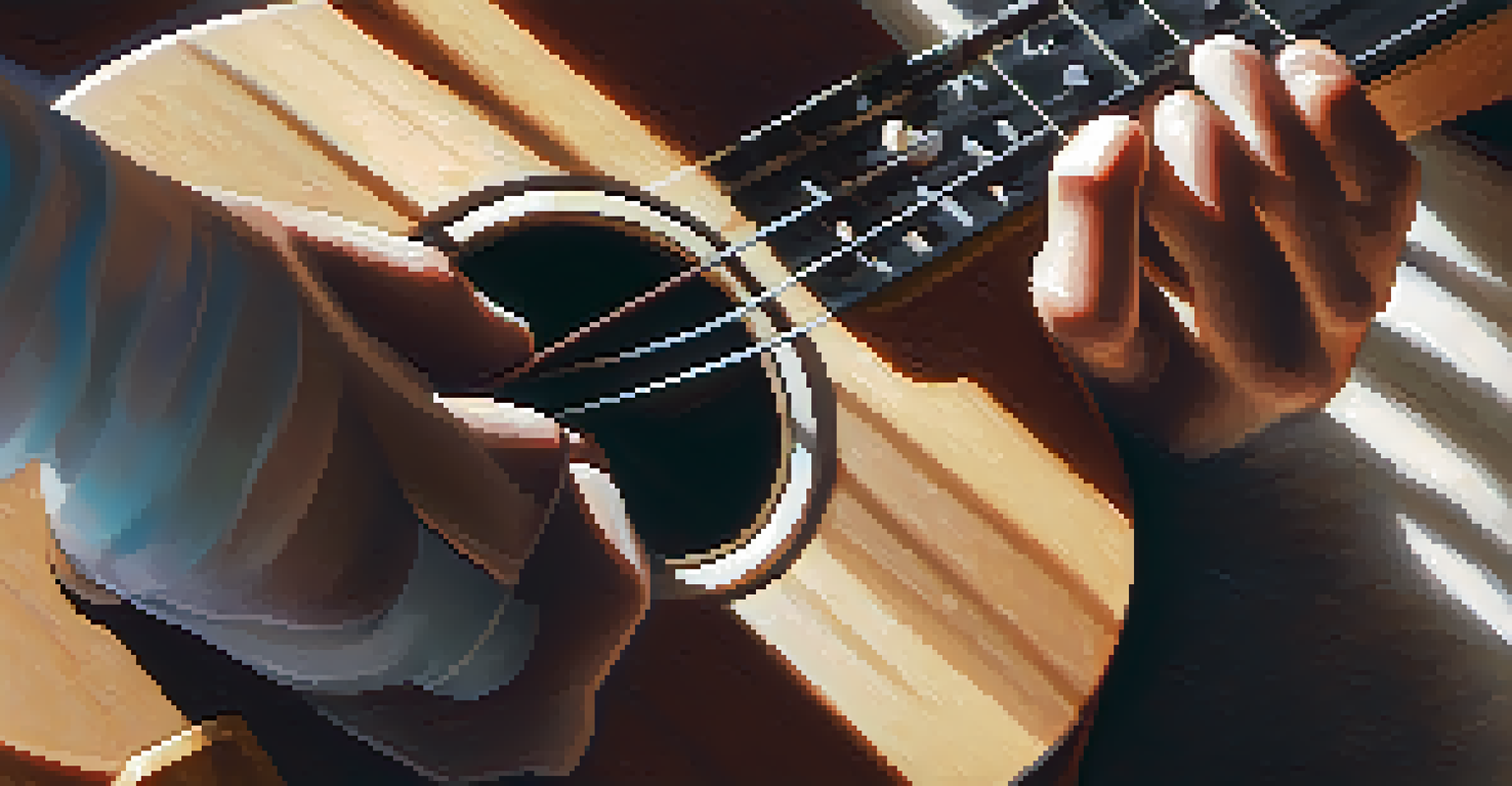Essential Ukulele Maintenance Tips for Long-lasting Use

Regular Tuning Keeps Your Ukulele Sounding Great
One of the most important aspects of ukulele maintenance is regular tuning. Just like any instrument, a ukulele needs to be tuned before each session to ensure it sounds its best. Using a reliable tuner can make this process quick and easy, helping you develop a good ear for pitch over time.
The beauty of music is that it connects people. The ukulele is a perfect instrument for that, bringing joy and harmony wherever it goes.
If you notice your ukulele sounding off, even after tuning, it might be time to check the strings. Changes in temperature or humidity can affect tuning stability, so keep an eye on those environmental factors. Remember, a well-tuned instrument will not only sound better but will also make playing more enjoyable.
To maintain tuning, consider using nylon or fluorocarbon strings, as they tend to hold their pitch better than other types. Regularly check your tuning pegs for any slippage, and tighten them if needed to prevent strings from going out of tune during a performance.
Keep Your Strings Clean for Better Performance
The strings on your ukulele are where the magic happens, so keeping them clean is essential for optimal sound. Dirt, oils, and grime can build up over time, affecting both tone and playability. A simple wipe-down with a soft cloth after each session can go a long way in prolonging string life.

If your strings are particularly dirty, consider using a dedicated string cleaner or a small amount of rubbing alcohol on a cloth. Just be sure to avoid getting any cleaner on the wood of the ukulele, as it can damage the finish. Clean strings not only enhance sound quality but also make it easier to fret notes accurately.
Keep Strings Clean for Longevity
Cleaning your ukulele strings regularly helps maintain their tone and playability.
Additionally, don’t hesitate to change your strings regularly, depending on how often you play. A good rule of thumb is to replace them every few weeks for frequent players, or once a month for casual strummers. Fresh strings will help keep your ukulele sounding bright and lively.
Store Your Ukulele Properly to Prevent Damage
Where you store your ukulele can significantly impact its longevity. Ideally, it should be kept in a protective case or bag when not in use to shield it from dust and accidental damage. Avoid leaving it in extreme temperatures or direct sunlight, as these conditions can warp the wood and affect sound quality.
In order to be a good musician, you need to be a good steward of your instrument.
For those who travel with their ukulele, consider investing in a hard case for added protection. A soft gig bag is great for quick trips, but a hard case can save your instrument from bumps and drops. Always secure your ukulele in the case when transporting to keep it safe from the elements.
Lastly, try to store your ukulele in a room with stable humidity levels. Wood can expand or contract when exposed to moisture, so using a humidifier or dehumidifier in your music space can help maintain a balanced environment. This simple step can prevent cracks and other serious issues down the line.
Regularly Check for Structural Issues
Just like any musical instrument, your ukulele may develop structural issues over time. Regularly check for cracks, loose parts, or signs of wear and tear. Taking a proactive approach can prevent small problems from becoming major repairs, saving you time and money in the long run.
Pay special attention to the neck of the ukulele, as any warping can affect playability. If you notice any significant changes or if something feels off while you’re strumming, it might be time for a professional inspection. Many musicians overlook this step, but it’s crucial for maintaining the instrument's integrity.
Proper Storage Prevents Damage
Storing your ukulele in a protective case and controlling humidity can significantly extend its lifespan.
Additionally, keep an eye on the bridge and soundboard. These components are vital for sound production and can be susceptible to issues over time. If you notice any lifting or damage, consult a luthier—an expert in stringed instruments—who can help restore your ukulele to its former glory.
Use Humidity Control for Wood Preservation
Wood is a natural material that can be sensitive to changes in humidity. For ukulele players, maintaining the right humidity level is crucial for preserving the wood. Ideally, you want to keep your instrument in an environment with humidity levels between 40% and 60% to prevent cracks and warping.
Consider investing in a hygrometer to monitor the humidity in your music space. If the levels are too low, a simple room humidifier can help create a more stable environment. Conversely, if humidity is too high, a dehumidifier can prevent moisture from damaging your ukulele.
If you live in an area with extreme weather changes, you might also want to use a humidifier specifically designed for musical instruments. These devices can be placed inside your ukulele case to maintain optimal conditions. Proper humidity control can significantly extend the life of your instrument and keep it sounding its best.
Get Comfortable with Basic Repairs
While it's always best to leave major repairs to professionals, having some basic repair skills can help you tackle minor issues yourself. Learning how to change strings, tighten loose tuners, or even fix a small crack can save you time and money. Plus, it gives you a greater understanding of your instrument.
YouTube and online tutorials are fantastic resources for learning these skills. Many experienced musicians share step-by-step guides for common ukulele repairs, making it easier than ever to get hands-on. Just remember, practice makes perfect, and don’t hesitate to ask for help if you’re unsure.
Regular Tuning is Essential
Consistently tuning your ukulele enhances sound quality and playability.
Moreover, having a small toolkit specifically for your ukulele can be incredibly helpful. Stock it with items like string cutters, a tuner, and a screwdriver for quick fixes. This way, you’ll always be prepared to address issues before they escalate.
Protect Your Ukulele from Environmental Factors
Environmental factors can have a significant impact on your ukulele's health. Extreme temperatures, humidity fluctuations, and even sunlight can all lead to damage. Being aware of these influences can help you take preventative measures to protect your instrument.
For instance, if you're playing outdoors, consider using a UV-protective cover or a parasol to shield your ukulele from direct sunlight. If you’ll be away from home, avoid leaving your instrument in the car, as extreme heat or cold can warp the wood and ruin your sound.

Additionally, during the winter months, heating systems can dry out the air, affecting your ukulele. As mentioned earlier, using a humidifier can help combat this issue. By taking these steps, you can create an environment that keeps your ukulele safe and sounding beautiful.